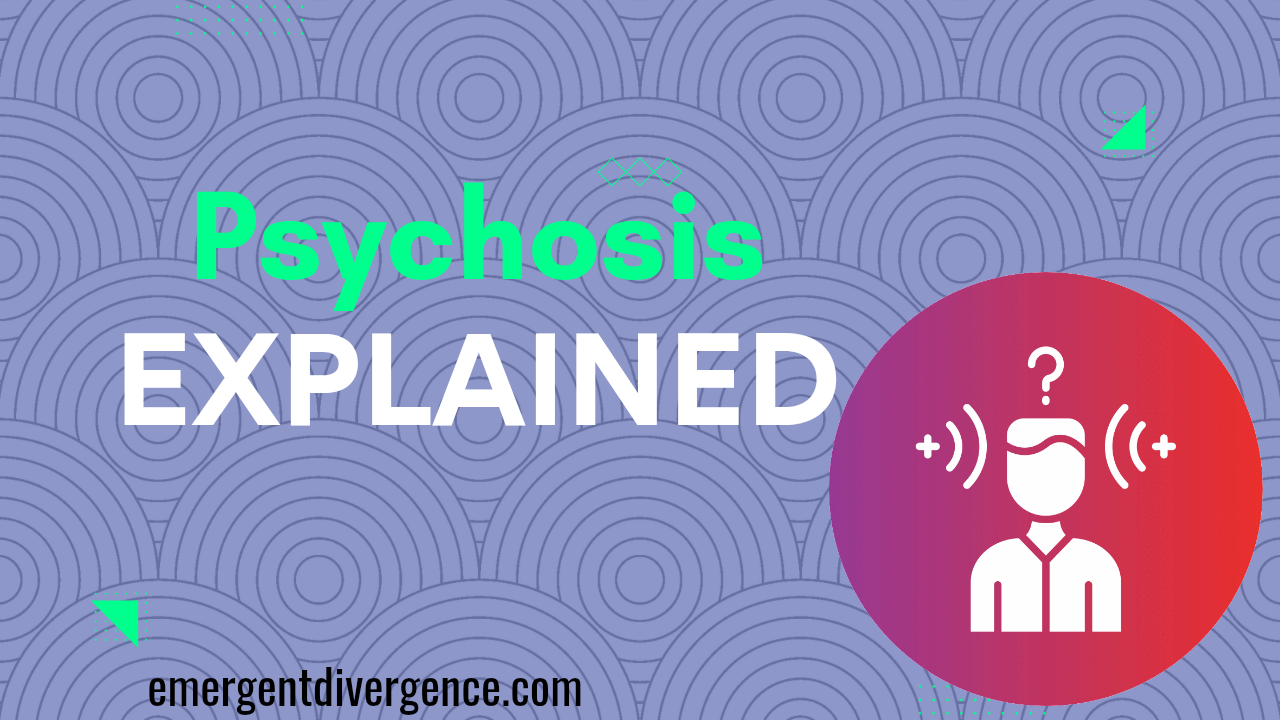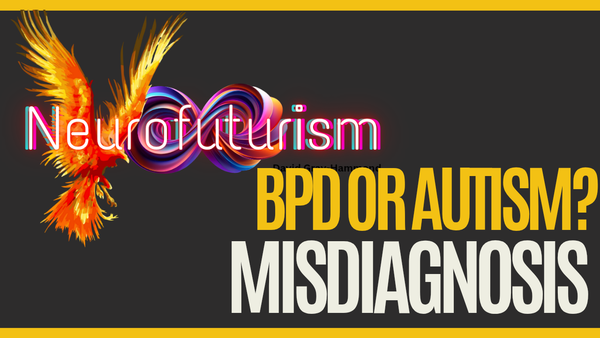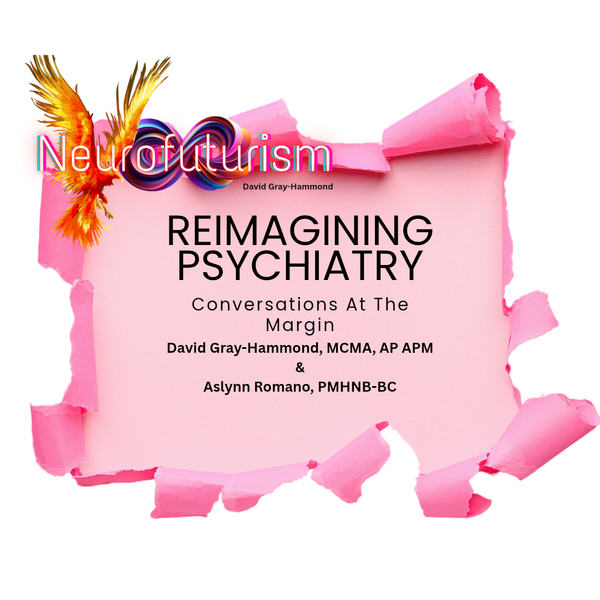Am I Experiencing Psychosis?
By the nature of the experience, self-identification is a hard target to hit without a great deal of self-reflection. While I have argued, and truly believe that there is a transformative element to the psychotic experience that can be channeled into positive change, I would not want to detract from

A question that people often come to me with, either explicitly or implicitly, is my opinion on whether or not they are experiencing psychosis. This is complicated. I am in no way qualified to diagnose psychosis, and yet, as a neurodivergent experience, those of us who have journeyed through it first hand can probably give a more detailed context than a psychiatrist or their diagnostic manual, in most cases. At this point I will give a Trigger Warning for Detailed Discussion of Psychotic Experiences.
Unfortunately, that is not where the complexities end. By the nature of the experience, self-identification is a hard target to hit without a great deal of self-reflection. While I have argued, and truly believe that there is a transformative element to the psychotic experience that can be channeled into positive change, I would not want to detract from the very distressing aspects of the experience that can and do harm and end the lives of many people.
The final note on this introduction is that as an Autistic and ADHD human, my experience may not necessarily be generalisable. While I will endeavour to explore core parts of the psychotic experience, the context of my own is better understood in conjunction with my further neurodivergence. For a deeper exploration of my experiences, you can read my book A Guide to Autism and Psychosis.
Diagnosing Psychosis
Psychosis can have many intricate features, but a psychiatrist is likely to look for three features in particular.
Hallucinations
These are sensory experiences generated by the mind that are not occurring within collectively shared reality. This could include:
- Seeing people that aren't there
- Hearing voices that no one else can hear
- Feeling insects crawling on the skin that do not exist
- Tasting poison in food that is perfectly safe to eat
- Smelling smoke when nothing is burning
Those examples show that we can hallucinate in any of our senses, but people often forget that we also have three more senses; interoception (our internal sense of our bodily state), proprioception (the feedback from our body parts that tell us where our body is in space), and vestibular (our senses of our orientation in space). I have personally experienced the following hallucinations that involve these senses:
- The feeling that my heartbeat has become irregular or stopped
- The feeling that I am falling upwards into the sky or have been thrown violently sideways
- The feeling that I have had a great increase or decrease in height
Some hallucinations are easier to identify than others, and our ability to do so also depends on our level of insight which I will explore more later.
Delusions
Delusions are beliefs we hold about the world that have no basis in truth, and that we contrinue to hold onto and think about (to distressing lengths) despite evidence to the contrary). It is more complicated than simply being wrong about something. The common tendency to accuse people of being delusional when we disagree with them can lead to harmful stigma.
There are various types of delusions, but for the sake of brevity, I will focus on two of the most common forms of delusion:
- Persecutory Delusions- These delusions usually involve a person feeling as though they are being targeted, harassed, or hunted by a person or group who means them harm. My own delusions of this type have revolved around me being trapped in a computer simulation, under threat of being deleted at any second. I have also believed my food was being poisoned, and that my loved ones have been replaced with doppelgangers who are there to harm me.
- Grandiose Delusions- A person experiencing this type of delusion may believe that they have abilities, power, or status beyond that humanly possible or realistic. An example may be a person believing they are the leader of a country, or that they can read people's minds. A grandiose delusion I have experienced was that I had unified gravity with the other forces in physics and that I could time travel.
Confused Thoughts
This can be recognised by rapid and constant speech, often involving subject changes mid sentence and loss of train of thought resulting in abrupt pauses. When this has happened to me, my communication has been incomprehensible with sentences made of unrelated words and no discernible objective to my communication.
How Do I Know I Am Experiencing Psychosis?
One of the core features of psychosis for many people is that they don't know they are experiencing it. This doesn't mean that people never know when they are experiencing features of it. This comes down to the level of insight a person has into their psychological state.
When I am acutely psychotic the most insight I tend to have is that I am incredibly distressed, although I can sometimes recognise when I am hallucinating. In terms of delusions it is only in brief moments of clarity that I might recognise that the thoughts I am having are bizarre or unfounded. For all intents and purposes, my mind has generated a new reality, and I no longer have a foothold in our shared one. Nothing you can say or do will make my new reality any less real.
I am Schizophrenic, and even with medication will often find myself having transient psychotic experiences, however with treatment I have the insight to quickly recognise that what is happening is a part of my neurodivergence, and reflect upon why it is happening. For me, key indicators of psychosis are the following:
- I feel that people are manipulating or controlling me despite having no reason to think so
- I am concerned that someone or something is trying to harm me
- I am preoccupied with non-human entities
- I become concerned that my thoughts are being heard by others
- I am regularly seeing people or things that are not there
- I hear voices speaking to me or coming out of electronic devices
- My mood has become noticeably different
Are All Psychotic People Dangerous?
A person experiencing psychosis is more likely to be the victim of violence than the perpetrator. It should however be noted that psychosis can result in erratic, impulsive, and confused behaviour that can sometimes present a risk to themselves or others. The risk of violence significantly decreases with the correct support and increases with the use of drugs and alcohol. Ultimately, the idea of psychotic people as being generally dangerous is a harmful myth perpetuated by mainstream media and societal stigma and sanism.
What To Do
If you are concerned you are experiencing psychosis it is important that you seek support. Psychosis can have a significant impact on our lives and wellbeing, and while seeking support can be a challenging and scary experience, we do deserve to not live in a distressing state.
Resources For Psychotic and Related Experiences
Hearing Voices Network
A support and resource network for people wholeheartedly voices or have visions for a variety of reasons.
Mind
Mind are a charity in the UK that provide support and services for people experiencing mental health concerns. They have a resource page specifically focused on psychosis.
YoungMinds
YoungMinds have a page to support young people around psychosis.
Books I have Written That Talk About My Psychosis
Blog Posts About Psychosis
https://emergentdivergence.com/2023/06/05/creating-autistic-suffering-the-audhd-burnout-to-psychosis-cycle-a-deeper-look/ https://emergentdivergence.com/2024/06/12/the-audhd-burnout-to-psychosis-cycle-a-personal-experience/
Thank you for your support


